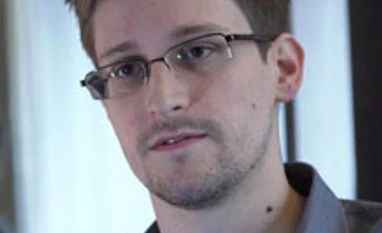FBI Director James Comey today said he does not consider Edward Snowden worthy of being called a whistleblower or hero, and was baffled by reports granting him the label.
The federal criminal investigation and intelligence chief swiftly dismissed calls for clemency issued by The New York Times and The Guardian newspapers, which said Snowden had done the United States a service by exposing the vast scope of secret digital surveillance run by the National Security Agency.
"I see the government operating the way the founders intended," Comey told a small group of reporters, "so I have trouble applying the whistleblower label to... Someone who basically disagrees with the way our government is structured and operates."
The revelations triggered outrage, including from some US telecoms users and foreign governments targeted in the indiscriminate sweeps, and it has touched off a political and legal debate in the United States.
While Snowden remains in Moscow, protected under a one-year grant of political asylum, US courts have begun examining the legality of the snooping and the White House has carried out an internal review.
Comey did not detail US evidence against Snowden, a former NSA contractor who has been charged under the Espionage Act.
"Whistleblowers are very important," he said. "I struggle to understand how you can apply the hero whistleblower label to that kind of information, so it confuses me."
US lawmakers, citing a confidential Pentagon report, warned that Snowden's theft of 1.7 million secret documents could potentially put US military forces in "lethal" danger worldwide.
"Snowden handed terrorists a copy of our country's playbook and now we are paying the price," the House Intelligence Committee's top Democrat Dutch Ruppersberger said.
"We have begun to see terrorists changing their methods because of the leaks and this report indicates that the harm to our country and its citizens will only continue to endure."
The lawmakers' reaction to the report came on the same day President Barack Obama met with US lawmakers, including critics of the NSA surveillance operations, to discuss possible reforms to the programs.
The federal criminal investigation and intelligence chief swiftly dismissed calls for clemency issued by The New York Times and The Guardian newspapers, which said Snowden had done the United States a service by exposing the vast scope of secret digital surveillance run by the National Security Agency.
"I see the government operating the way the founders intended," Comey told a small group of reporters, "so I have trouble applying the whistleblower label to... Someone who basically disagrees with the way our government is structured and operates."
More From This Section
Reports based on Snowden's leaked files have revealed a global dragnet run by Washington and its allies in the English-speaking world, scooping up Internet traffic and telephone call logs.
The revelations triggered outrage, including from some US telecoms users and foreign governments targeted in the indiscriminate sweeps, and it has touched off a political and legal debate in the United States.
While Snowden remains in Moscow, protected under a one-year grant of political asylum, US courts have begun examining the legality of the snooping and the White House has carried out an internal review.
Comey did not detail US evidence against Snowden, a former NSA contractor who has been charged under the Espionage Act.
"Whistleblowers are very important," he said. "I struggle to understand how you can apply the hero whistleblower label to that kind of information, so it confuses me."
US lawmakers, citing a confidential Pentagon report, warned that Snowden's theft of 1.7 million secret documents could potentially put US military forces in "lethal" danger worldwide.
"Snowden handed terrorists a copy of our country's playbook and now we are paying the price," the House Intelligence Committee's top Democrat Dutch Ruppersberger said.
"We have begun to see terrorists changing their methods because of the leaks and this report indicates that the harm to our country and its citizens will only continue to endure."
The lawmakers' reaction to the report came on the same day President Barack Obama met with US lawmakers, including critics of the NSA surveillance operations, to discuss possible reforms to the programs.
)